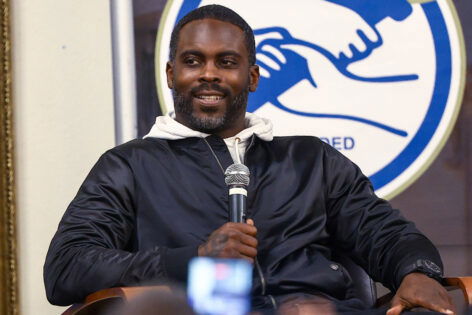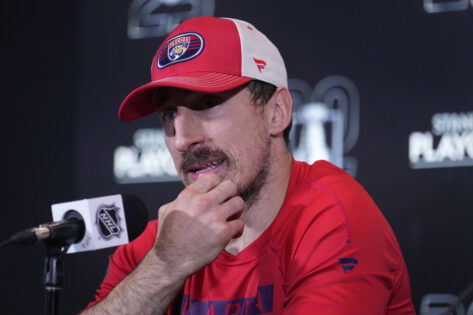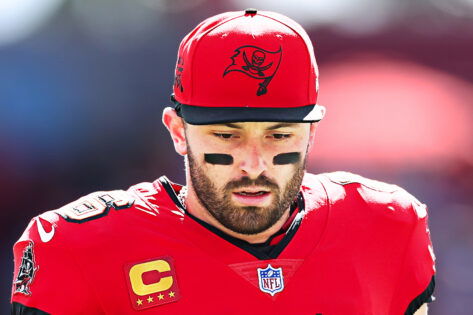When Michael Vick stormed onto the scene at Virginia Tech, the headlines weren’t just about his cannon arm or blazing open-field speed. Something far deeper was at stake. A question hung in the air, echoing through locker rooms, draft boards, and front offices: Would the NFL truly embrace a mobile, dual-threat Black quarterback as the face of a franchise? “There was a belief in the NFL that Black players were not smart enough to play the ultimate thinking man’s position.” ESPN reporter Jason Reid told ABC News. Reid, author of The Rise of Black Quarterback: What it means for America, laid bare the painful reality. Redid stated, “They thought they were inferior.” For decades, this damaging stereotype lingered, denying countless athletes a shot at the quarterback position- the sport’s most cerebral position.
But destiny had a different plan for Vick. One that would shatter those old narratives and help pave a new road. After leading Virginia Tech to a Big East Championship and earning Gator MVP honors, Vick became the first black quarterback ever drafted at No.1 overall. In 2006, with the Atlanta Falcons, Vick became the first quarterback in league history to rush over 1000 yards in a single season. But this was just the beginning of a historic moment, one that started with humble roots and a fire that never dimmed.
“I was always just aware of my surroundings, and like had a goal, and I wanted to accomplish something…It was like sacrifices every turn. But I loved it because it was a challenge, and it paid off for me one day,” Vick reflected. In an interview segment for the Cookout Series,Vick opened up about the hurdles he faced as a young Black QB coming fresh out of Virginia Tech, making it up to the top line.“Yeah. I just knew it was an uphill battle. I knew I had to be not be great, but I knew I just had to not make mistakes. So, my goal was to hopefully one day get drafted. Maybe it’s the first round, maybe it’s the fifth round, maybe it’s the seventh round. I just want a shot. I just want a chance.”
Vick admitted that college football quickly humbled him. What he thought he knew about quarterbacking unraveled once he reached Virginia Tech. He had to rebuild from the ground up. “It’s a formula to playing quarterback. And I had to learn how to play quarterback. And it took about five months before I started understanding the structure of what was happening on the field; I was 19 years old. I was really young, but focused, and you know, just remember the promises I made to myself. Like all the sacrifices to get there. Now I’m here.”
And his sacrifices did pay off. Throughout his NFL chapter, Vick earned four Pro Bowl selections and rushed for over 6,000 yards, a quarterback record that still stands. But not every chapter in his story was triumphant. His career was famously derailed by a dogfighting scandal. But Vicky took full responsibility. After his release from federal prison, he told 60 Minutes, “I blame me… I cried so many nights.” His redemption arc soon began, and he became an outspoken advocate for animal welfare and earned a second shot with the Philadelphia Eagles, where he was named the NFL Comeback Player of the year. “They said, We believe in you. Will give you the keys to the franchise.” Vick recalled. “I thought that was special.”
African-American athletes, playing in college and other leagues, had been winning games for a long time. Former NFL legend Fritz Pollard was such a player. He was the first African-American NFL QB in 1923 for the Hammond Pros. “He really was the one to blaze the path,” as Reid put it. From 1933 to 1946, league owners informally banned African-American players from joining the teams. The post-World War era saw some improvement, but not much. The QB position remained largely out of reach for black athletes. Vick’s legacy, however, isn’t just measured in yards, awards, or records; it’s in the doors he opened.
Michael Vick on his legacy, being a trailblazer for black QBs
Michael Vick’s rise helped create space for the next generation of dual-threat Black quarterbacks. Inspiring the next generation of NFL stars such as Patrick Mahomes, Jalen Hurts, and Lamar Jackson- just to name a few. A legacy that helped change the culture and shape today’s league.
“Yeah, I mean, I look at the NFL and I smile every week, every Sunday, Monday, Thursday, uh, when it’s taking place to know that I took part in that and, uh, helping change the culture,” Michael Vick said. “But it was a lot of guys that came before me who helped change the culture and help the growth of the National Football League in terms of, you know, what it may look like, you know, at certain positions.”
Vick continues by saying, “I don’t take it for granted being the first African-American quarterback drafted. It didn’t hit me at the time what was actually happening. But as the years go on, I feel a great sense of entitlement to, you know, feel good about, you know, that moment and what it meant for, you know, our history.”
Today, Vick’s name stands alongside pioneers like Fritz Pollard and Warren Moon. And he’s still giving back, now serving as head coach at HBCU Norfolk State, Vick is helping mentor and mold the next generation, giving young players he once fought so hard to find.
The post HBCU’s Michael Vick Confesses The Fear He Lived With as Black QB & Trailblazing Figure for His Community appeared first on EssentiallySports.



